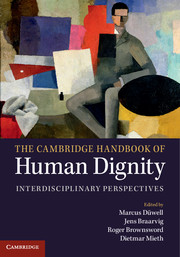Book contents
- Frontmatter
- Contents
- List of contributors
- Foreword
- Why a handbook on human dignity?
- Acknowledgments
- 1 Human dignity from a legal perspective
- 2 Human dignity: concepts, discussions, philosophical perspectives
- Part I Origins of the concept in European history
- Part II Beyond the scope of the European tradition
- Part III Systematic conceptualization
- Part IV Legal implementation
- Part V Conflicts and violence
- Part VI Contexts of justice
- Part VII Biology and bioethics
- Appendix 1 Further reading
- Appendix 2 Universal Declaration of Human Rights
- Index
- References
1 - Human dignity from a legal perspective
Published online by Cambridge University Press: 05 March 2015
- Frontmatter
- Contents
- List of contributors
- Foreword
- Why a handbook on human dignity?
- Acknowledgments
- 1 Human dignity from a legal perspective
- 2 Human dignity: concepts, discussions, philosophical perspectives
- Part I Origins of the concept in European history
- Part II Beyond the scope of the European tradition
- Part III Systematic conceptualization
- Part IV Legal implementation
- Part V Conflicts and violence
- Part VI Contexts of justice
- Part VII Biology and bioethics
- Appendix 1 Further reading
- Appendix 2 Universal Declaration of Human Rights
- Index
- References
Summary
Introduction
As the contributions to this handbook make clear, human dignity is a fundamental value in many legal systems. In both the northern and the southern hemispheres, in common law and civilian legal systems, we find that human dignity plays a prominent role. It is also a cornerstone concept of many regional and international conventions and declarations. However, the jurisprudence of human dignity betrays a familiar tension. Whereas, in some cases, human dignity is articulated and applied in a ‘liberal’ spirit (underpinned by an ‘empowerment’ conception), in others the guiding spirit is ‘conservative’ (underpinned by a conception of ‘human dignity as constraint’) (Beyleveld and Brownsword 2001). Broadly speaking, while liberals appeal to human dignity in order to protect and to extend the sphere of individual choice, conservatives appeal to human dignity in order to impose limits on what they see as the legitimate sphere of individual choice.
Introducing the legal section of the handbook, three general issues are addressed. First, there is the question of how we should view the burgeoning references to human dignity (often in conjunction with human rights) in international and regional instruments. Second, there is the question of how we should understand the role of human dignity in national legal systems. Finally, there is the question of whether positive law is enhanced by references to human dignity or whether it would be an improvement to eliminate all such legal allusions.
- Type
- Chapter
- Information
- The Cambridge Handbook of Human DignityInterdisciplinary Perspectives, pp. 1 - 22Publisher: Cambridge University PressPrint publication year: 2014
References
- 7
- Cited by



